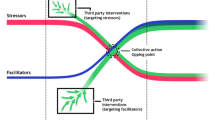Abstract
Despite its growing currency in academic and policy circles, social cohesion is a term in need of a clearer and more rigorous definition. This article provides a critical review of the ways social cohesion has been conceptualized in the literature in many cases, definitions are too loosely made, with a common confusion between the content and the causes or effects of social cohesion. This motivates us to propose a refined definition that we hope is clearer and more rigorous. We will show how our definition could be operationalized into a measurement scheme that facilitates empirical work on social cohesion.
Similar content being viewed by others
References
C. Beauvais J. Jenson (2002) ‘Social cohesion: updating the state of the research’ Canadian Policy Research Networks Ottawa
P. Berger (1998) The Limits of Social Cohesion: Conflict and Mediation in Pluralist Societies Westview Boulder, Colorado
R. Berger-Schmitt (2000) ‘Social cohesion as an aspect of the quality of societies: concept and measurement’ Centre for Survey Research and Methodology Mannheim
P. Bernard (2000) ‘Social cohesion: a dialectical critique of a quasi-concept’ Strategic Research and Analysis Directorate, Department of Canadian Heritage Ottawa
K. A. Bollen R. H. Hoyle (2001) ArticleTitle‘Perceived cohesion: a conceptual and empirical examination’ Social Forces 69 IssueID2 479–504
Canadian Council on Social Development: 2000, ‘Social cohesion in canada: possible indicators highlights’, Paper SRA-542, (Strategic Research and Analysis Directorate, Department of Canadian Heritage, Ottawa).
Chan, J. and E. Chan: 2004,Social Cohesion without Institutional Mediation? The Case of Hong Kong, available online at the homepage of the Centre for Civil Society and Governance, the University of Hong Kong (http://web.hku.hk/∼ccsg/papers.html).
L. Couch J. Adams W. Jones (1996) ArticleTitle‘The assessment of trust orientation’ Journal of Personality Assessment 67 IssueID2 305–323 Occurrence Handle10.1207/s15327752jpa6702_7
G. Duhaime E. Searles P. Usher H. Myers P. Frechette (2004) ArticleTitle‘Social cohesion and living conditions in the Canadian artic: from theory to measurement’ Social Indicators Research 66 295–317 Occurrence Handle10.1023/B:SOCI.0000003726.35478.fc
T. R. Feldman S. Assaf (1999) ‘Social capital: conceptual frameworks and empirical evidence: an annotated bibliography’ World Bank Washington
I. Gough G. Olofsson (Eds) (1999) Capitalism and Social Cohesion: Essays on Exclusion and Integration Macmillan Basingstoke
‘Inclusion for all: A Canadian Roadmap to Social Cohesion’, accessed on 17 June 2004 at http://canada.justice.gc.ca/en/ps/rs/rep/comsocohe.pdf
M. S. Jeannotte (2000) ‘Social cohesion around the world: an international comparison of definitions and issues’ Strategic Research and Analysis Directorate, Department of Canadian Heritage Ottawa
M. S. Jeannotte D. Stanley R. Pendakur B. Jamieson M. Williams A. Aizlewood (2002) ‘Buying in or Dropping out: the Public Policy Implications of Social Cohesion Research’ Strategic Research and Analysis Directorate, Department of Canadian Heritage Ottawa
J. Jenson (1998) ‘Mapping social cohesion: the state of canadian research’ Strategic Research and Analysis Directorate, Department of Canadian Heritage Ottawa
A. Kearns R. Forrest (2000) ArticleTitle‘Social cohesion and multilevel urban governance’ Urban Studies 37 995–1071
D. Lockwood (1992) Solidarity and Schism, ‘The problem of disorder’ in durkheimian and marxist sociology Clarendon Press Oxford
Lockwood, D.: 1999, ‘Civic integration and social cohesion’, in Gough and Olofsson (eds.), Capitalism and Social Cohesion, ch.4.
Mortensen, N.: 1999, ‘Mapping system integration and social integration’, in Gough and Olofsson (eds.), Capitalism and Social Cohesion, ch.2.
L. Osberg (2003) ‘Introduction’ L. Osberg (Eds) The Economic Implication of Social Cohesion University of Toronto Press Toronto
Pahl, R. E.: 1991, ‘The search for social cohesion: from durkheim to the european commission’, European Journal of Sociology xxxii, pp. 345–360.
R. D. Putnam (1993) ArticleTitle‘The prosperous community – social capital and public life’ American Prospect 13 35–42
R. D. Putnam (2000) Bowling Alone: the Collapse and Revival of American Community Simon and Schuster New York
Ritzen, J., W. Easterly and M. Woolcock: 2000, ‘On “Good” Politicians and “Bad” Policies: Social Cohesion, Institutions, and Growth’, World Bank Policy Research Working Paper 2448 (The World Bank).
Author information
Authors and Affiliations
Corresponding author
Rights and permissions
About this article
Cite this article
Chan, J., To, HP. & Chan, E. Reconsidering Social Cohesion: Developing a Definition and Analytical Framework for Empirical Research. Soc Indic Res 75, 273–302 (2006). https://doi.org/10.1007/s11205-005-2118-1
Accepted:
Issue Date:
DOI: https://doi.org/10.1007/s11205-005-2118-1



